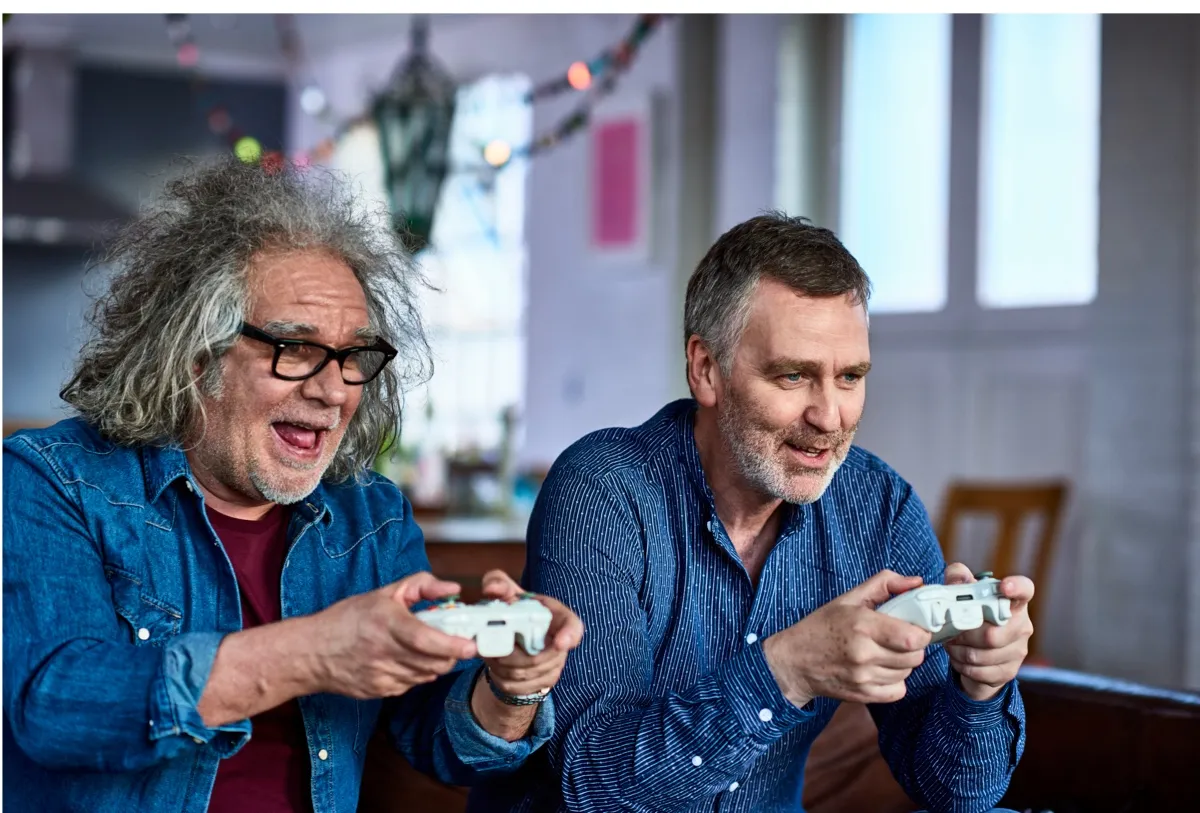The internet is full of supplements that promise to boost your IQ, while a visit to your phone’s app store will reveal dozens of brain-training games that claim to make you more intelligent.While these quick-fix ideas might sound promising, it’s far better to save your money and put your faith in science.
Here, you’ll find easy, research-based hacks that will help make you smarter and keep your brain firing on all cylinders as you age.
Simple ways to make yourself smarter
1. Play video games

There is no convincing evidence that brain-training apps can make you smarter.
However, one line of enquiry has compared brain-training games to run-of-the-mill video games, and this is where things get interesting. In a 2015 study comparing the brain-training game Lumosity with the first-person puzzle game Portal 2, researchers found thatLumosity players didn’t show boosts in problem-solving and spatial skills, but Portal 2 players did.
More recently, in 2020, researchers based at the Karolinska Institutet in Sweden looked at data from some 9,000 American children and found that kids aged 9 or 10 who played video games for above-average amounts of timedidn’t show any differences in intelligencecompared with those who played less.
The study caught up with 5,000 of those children two years later and discovered that by the age of 12, the kids who played video games had 2.5 more IQ points than average.
Elsewhere, studies in older populations have suggested that there are similar benefits. For example, a 2020 study of adults aged 60 to 80 showed that playing games like Angry Birds or Super Mario 3D Worldresulted in memory improvementsover a four-week timespan.
Along similar lines, a study of nearly 45,000 participants published in 2019 showed that while there weresmall cognitive benefits of playing brain-training games, these were negligible in comparison to the effects of video games in general.
- Read more about how video games make you smarter
2. Take naps

We've all heard how important a good night's sleep is for your brain, but if you struggle to get the recommended seven to nine hours a night, then there's nothing wrong with having 40 winks during the day to catch up on lost sleep.
If you believe the likes of Thomas Edison, Albert Einstein and Salvador Dali, naps absolutely make you more creative. Many famous scientists and artists have relied on naps to sharpen their minds, solve problems or generate ideas. And modern research validates them, with papers showing improvements in a range of cognitive skills from creativity to motor learning after a nap.
Dr Delphine Oudiette of the Paris Brain Institute devised a study to test whether a micronap could improve creativity. She presented study participants with a mathematical problem and, if they couldn’t solve it, they were asked to recline on a chair and rest.
After the break, those people who drifted into stage 1 sleep – that hazy, half-awake state before the shutters come down – were three times more likely to solve the problem than people who didn’t nap. “It seems we have a creative switch there when you doze,” Oudiette says.
- Read more about naps
3. Be more open-minded

Your personality reflects your habits of thought, behaviour and emotions as they play out over the longer term. It’s distinct from moods or emotional states that vary over shorter timescales of minutes or hours.
According to the most evidence-based and widely endorsed OCEAN model of personality, the five main trait dimensions are:
- Open-mindedness: how willing you are to embrace new ideas and experiences.
- Conscientiousness: how self-disciplined and ambitious.
- Extraversion: how sociable and drawn to reward you are.
- Agreeability: how friendly and trusting you are.
- Neuroticism: how anxious and emotionally sensitive you are.
Together these are known as the ‘Big Five’ traits. Your scores on them are incredibly consequential, predicting your career success, happiness and even your longevity. For instance, strong extraverts tend to live shorter, happier lives. Highly conscientious people tend to do better at work. And people who are highly open-minded are less vulnerable to dementia.
The older we get, the more closed-minded we tend to become; that is, more stuck in our ways and beliefs. One way to counter this is to deliberately seek out new experiences and perspectives.
Make a pledge to try a different restaurant each time you eat out, for instance, or visit different destinations for your holidays rather than always returning to the same spot. Consider dabbling in new art forms, such as poetry or opera, that you might not have tried before.
Less obvious is to work on your physical and mental fitness, for example by taking regular walks and completing mind games and puzzles.
Such activities have been linked with increases in open-mindedness. The theory is that they help build your confidence and therefore your willingness to try new things.
- Read more about personality and open-mindedness
4. Exercise regularly

Our brains were built to move our bodies toward food and mates, and away from predators.Exerciseis important for two reasons. The obvious one is that it oxygenates the blood. The brain runs on oxygenated glucose, carried by haemoglobin in the blood, and a fresh supply ofoxygenis good.
The non-obvious reason is that our brains, because they were built to navigate in unfamiliar surroundings, don’t do well when they’re not challenged by having to problem solve.
Every step you take on a treadmill or elliptical is helping you with the first of these two imperatives – getting your blood oxygenated – but it doesn’t help your brain to keep its navigational skillsand memory systems honed.
In contrast, every minute you walk on an unpaved trail, whether in a park or in the wilderness, requires you to make hundreds of micro-adjustments to foot pressure, angle, and pace. These adjustments stimulate the neural circuitry of your brain in the precise way that it evolved to be used.
The area that is most stimulated is your hippocampus, that seahorse-shaped structure critical to memory formation and retrieval. This is why so many studies show that memory is enhanced by physical activity.
- Read more about how exercise can boost your brain
5. Eat fish

Your brain is hungry. In fact, it is the hungriest organ in your body. Despite making up only around 2 per cent of your overall body weight, your brain consumes about 20 per cent of your body’s total energy requirement. But it is a mistake to think that it’s only energy that the brain needs to function well; a full complement of micronutrients in sufficient quantities are essential for a healthy brain.
Evidence is growing that deficiencies in these nutrients contribute to poor brain and mental health. Moreover, there is not a single point in the lifespan, from conception to old age, where nutrition doesn’t play an important role in brain structure and mental health.
For example, we know that it is important for women trying to conceive to take folic acid (a B vitamin) to prevent neural tube defects conditions such as spina bifida. Of course, it’s not just folic acid that the developing brain needs. The essential omega-3 fatty acids form the structural building blocks of brain cell membranes.
One of these fats, DHA, makes up between 10 and 20 per cent of the brain’s total fatty acid content. DHA promotes healthy neuronal morphology and cell signalling, allowing brain cells to communicate efficiently. During pregnancy, accumulation of DHA in the brain and retina is necessary for proper brain development and visual function.
The body is unable to synthesise adequate amounts of DHA, so it must come from the diet. Fortunately, it is abundant in seafood and oily fish such as sardines, mackerel, salmon and trout, and one 140g serving of mackerel supplies enough omega-3 for a week.
For people who don't eat fish, DHA is also found in algae. There are algal supplements available on the market. Other plant sources, like linseeds, hemp seeds, chia seeds, walnuts and soy contain an oil called ALA that the body can convert into DHA, so it's important that these are eaten as part of a balanced diet.
- Read more about brain food
6. Get enough sleep

What makes you feel great when you have it and a complete basket case when you miss out? That’s right – sleep. Something we should all spend roughly one-third of our time doing, but which we actually tend to squeeze at both ends, with tiredness and underperformance the result.
Sleep can work wonders with our ability to learn motor skills – anything from riding a bike to typing faster. Neuroscientist Dr Matthew Walker, then at Harvard Medical School, trained people to tap a complex series of keys on a computer keyboard and tested them 12 hours later. Those who did not sleep between the two sessions improved their performance by 2 per cent, whereas those who did were 20 per cent quicker without a loss of accuracy.
So if we get sufficient sleep, our memories can consolidate, which can help us learn more effectively.
- Read more about how sleep can make you smarter
